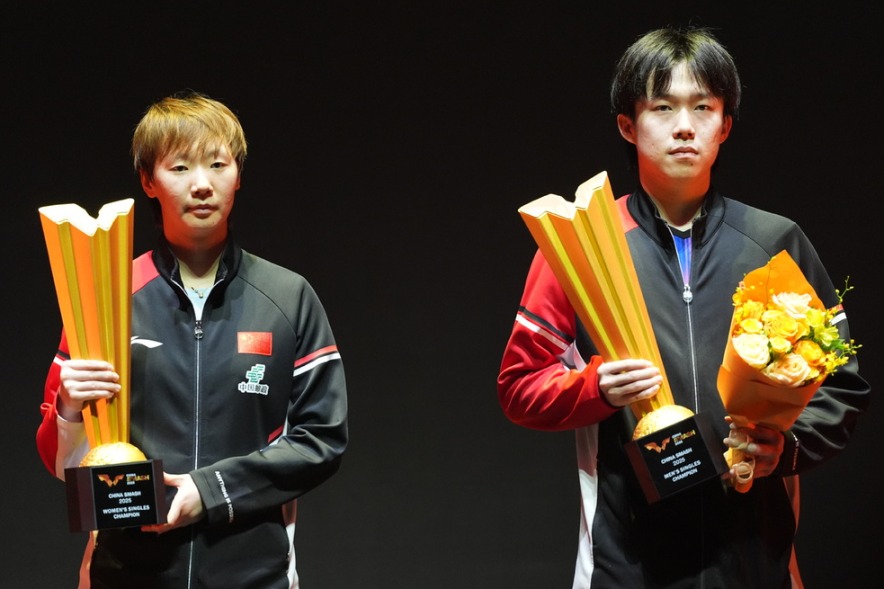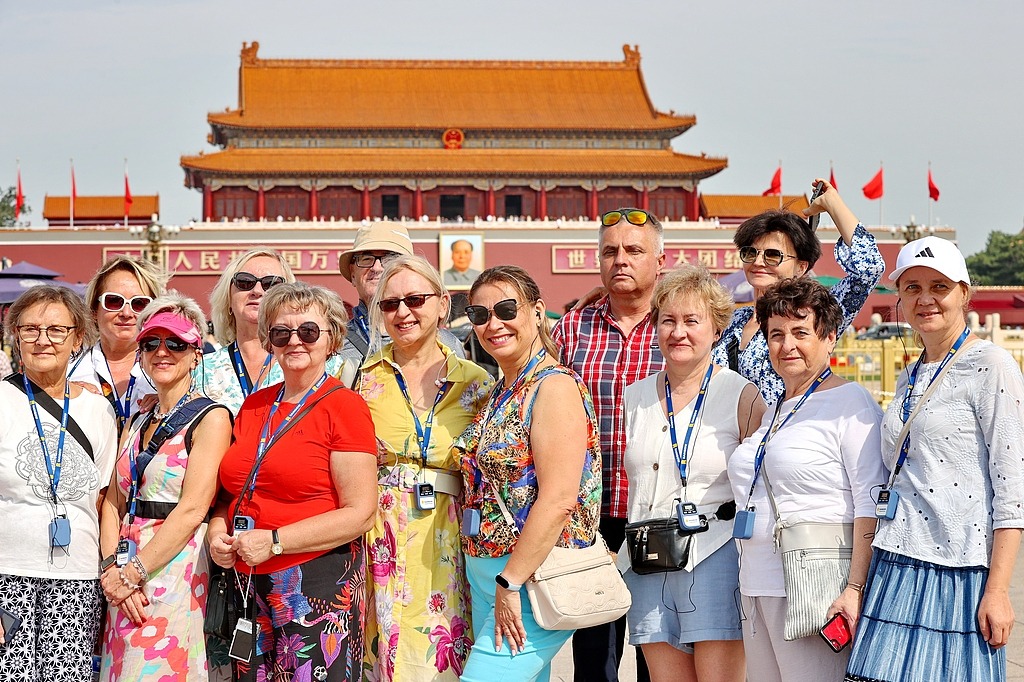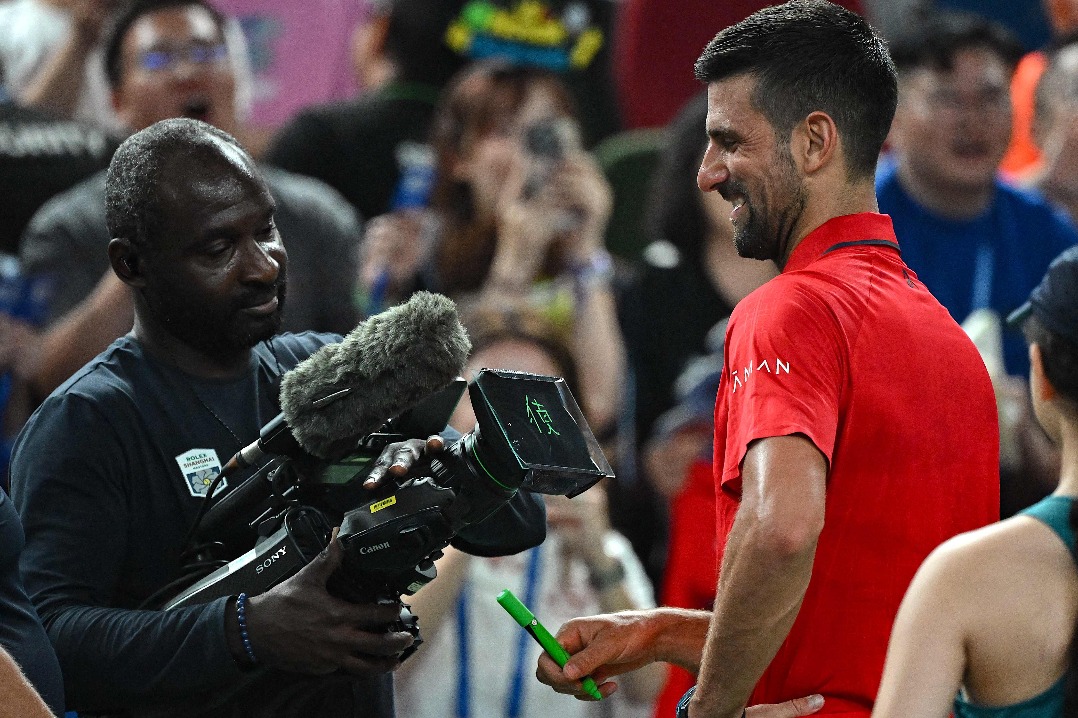Diving deep, making history
From pools to open water, freediving tests body and mind, capturing hearts as it takes center stage at the World Games for the very first time.

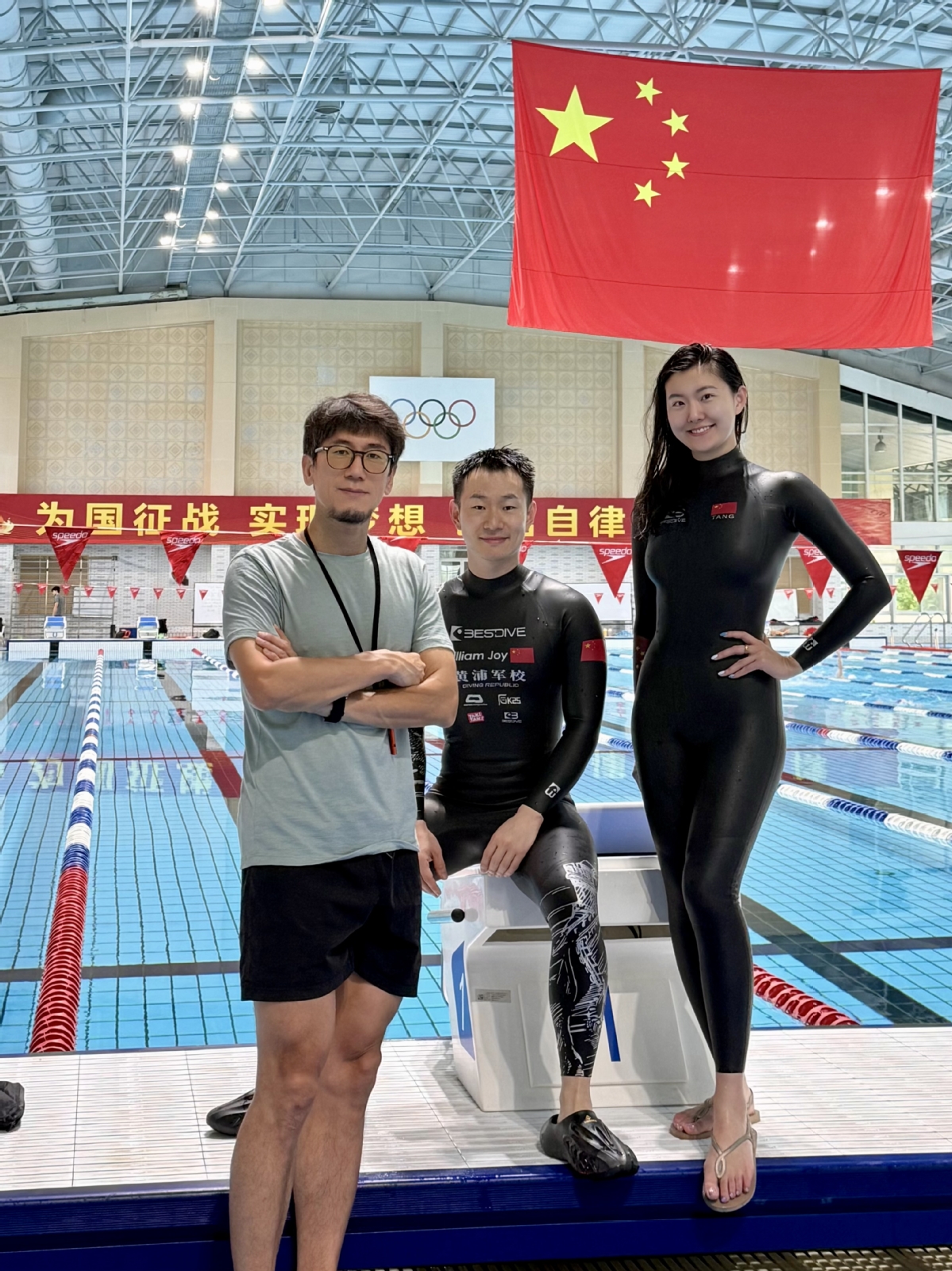
On the morning of Aug 10, freediving made its debut at the 2025 World Games in Chengdu, Sichuan province, with Tang Ke becoming the first Chinese athlete to take the stage in this newly added event.
As the lights flickered in the waiting area and the announcement of the competition echoed through the venue, Tang's heartbeat quickened.
The moment she stepped into the arena, the applause, cheers, and shouts of "Go for it!" filled the air. Spotting the national flag in the stands instantly magnified her sense of mission.
"Being the first Chinese freediver to compete at the World Games — and doing so on home soil — I felt incredibly honored, but also under a lot of pressure," said the 31-year-old.
Though still considered a niche sport, freediving's inclusion in the World Games marks a milestone.
"I believe this represents both recognition and a bold move by the International Olympic Committee (IOC)," said Tang's coach, Zhao Lei. "Since the International World Games Association is under the IOC, this could bring greater attention to the sport — and perhaps even open the door to the Olympics."
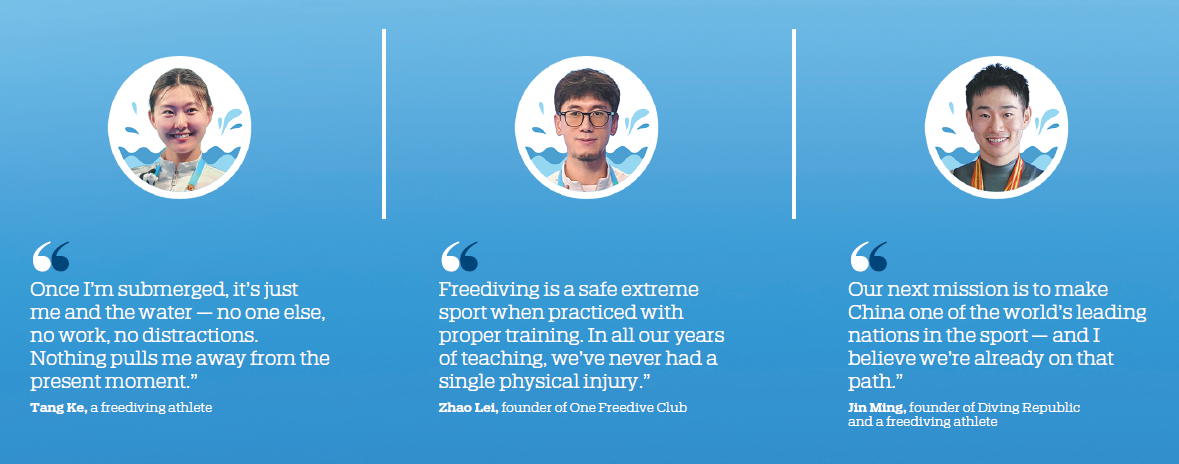
Growing influence
A longtime advocate for freediving in China, Zhao noted that the country has been actively supporting the sport, sending teams to compete in world championships every year.
Freediving has been rapidly gaining popularity in China. According to Zhao, since 2024, the number of certified freedivers in the country has increased by about 10 percent.
The General Administration of Sport of China has also introduced a system to evaluate freedivers' technical levels, with incentives that in some cases include bonus points for college or high school entrance exams.
Jin Ming, 32, Tang's teammate, pointed out two notable developments in the sport. "First, the competitiveness of athletes has improved significantly," he said. "Second, freediving is getting much more exposure and publicity."
He added that about 20 competitions under the International Association for the Development of Apnea (AIDA) are held in China each year, along with other events — amounting to a total of 30 to 40 competitions annually.
"In previous years, I was often the only athlete representing the national team. It felt quite lonely," Jin said. "Now, at World Games, I have teammates, a coach, and the General Administration of Sport leading the team. I'm thrilled to see the growing recognition and support for the sport in China."
The General Administration of Sport played a key role in preparations for the World Games. It worked with the Shanghai swimming team to provide freedivers with access to their pool and also organized a two-week training camp in Chengdu.
"These resources and regular training sessions, which we never had before, are incredibly helpful," Zhao said. "I believe more freedivers will emerge in the future, and more competitive athletes will rise."
For now, freediving in China is still largely a grassroots sport. Most competitive athletes are self-trained, including Jin and Tang, both based in Shanghai.
Jin runs a business in the new consumer sector, while Tang works as a software product manager. With demanding day jobs, they often have no choice but to train late at night in whatever pools they can find.
Like them, many freedivers start out in local clubs, gradually progressing toward professional competitions while juggling full-time careers.
Zhao's One Freedive Club, founded in 2013, was the first civilian freediving organization in China. Dedicated to teaching fundamental skills, it has already trained more than 10,000 students.
Jin's Diving Republic, founded in October 2019, takes a different approach with a strict admission policy and a strong focus on high performance.
The club has attracted many of China's top freedivers, whose members have set nearly 90 national records, more than 20 Asian records, and even one world record.
"The original goal of establishing this club was to push the boundaries of Chinese freediving," Jin said. "Our next mission is to make China one of the world's leading nations in the sport — and I believe we're already on that path."
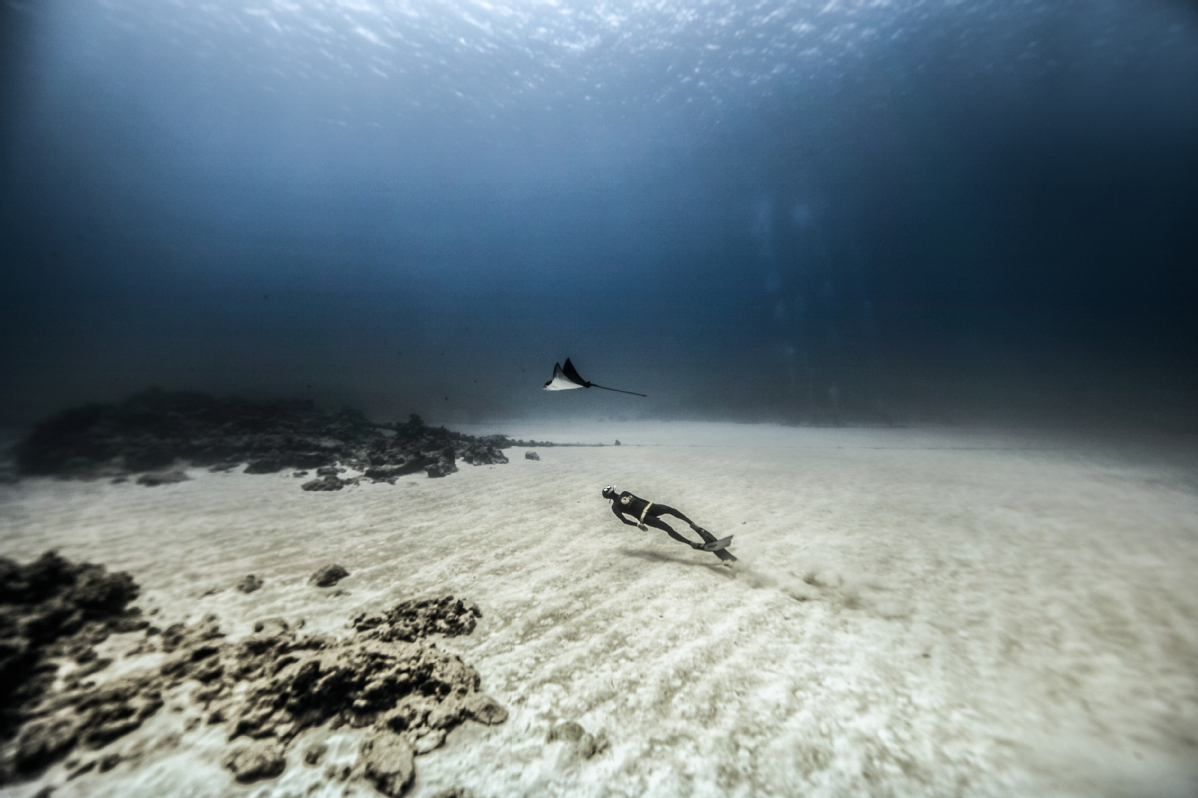
Unique charm
The reason amateur freedivers dedicate so much time and energy to the sport outside of work lies in its unique allure.
Tang described it as "minimalism and focus".
"What I love most about freediving is the deeply personal experience it offers," she said.
"Once I'm submerged, it's just me and the water — no one else, no work, no distractions. Nothing pulls me away from the present moment."
The sport also allows divers to blend seamlessly into the ocean and interact with marine life.
"Whether in open water or at an aquarium, you encounter a variety of creatures. Scuba diving creates bubbles that can scare them away. Freediving, on the other hand, makes them curious. They may see you as one of them and even come to play," Tang said. "It's like entering another world — freediving opens that door."
Jin is drawn to the sport's technical complexity. "Freediving is the only sport we know that challenges both the sympathetic and parasympathetic nervous systems," he explained.
Most Olympic sports primarily engage the sympathetic system, where excitement can boost performance — sprinting or swimming, for example. In contrast, sports like shooting or archery test the parasympathetic system, requiring athletes to stay calm.
Freediving demands both: the physical fitness to swim long distances underwater and the composure to minimize oxygen consumption.
This is why psychological training is essential, incorporating meditation, mindfulness, and visualization.
"Meditation sharpens focus. Mindfulness helps manage discomfort and the urge to surface by concentrating on each movement and technique. Visualization allows divers to rehearse competition scenarios mentally, reducing pre-competition anxiety," Zhao explained.
In preparation for the World Games, Zhao even used singing bowl therapy to calm athletes' nerves, which proved effective.
"Freediving is not just a competitive sport; it's a lifestyle," he said.
Zhao believes that when people face significant stress from work or life, freediving can help them focus on breath-holding and cultivate mindfulness.
He also challenges the stereotype that freediving is inherently dangerous.
"Freediving is a safe extreme sport when practiced with proper training. In all our years of teaching, we've never had a single physical injury," he said.
"Freediving is a sport worth trying for anyone looking for a break from the pressure of life," Zhao added.
guiqian@i21st.cn
Today's Top News
- Understanding the certainties of China's high-quality development
- Chinese FM to visit Italy, travel to Switzerland
- Takaichi's rise testing time for ties in region
- Trump tells Israel to 'stop' bombing after Hamas ceasefire response
- Japan poised to have first female PM after Takaichi victory
- Xi, Bangladeshi president exchange congratulations on 50th anniversary of ties
















